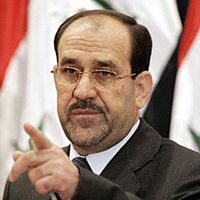Iraqi PM Calls on Iraqis for Patience after Baghdad Blasts
Wednesday Iraq's prime minister called Iraqis to stand by their security force. Meanwhile, angry lawmakers demanded called on top officials to resign following the third massive attack against government sites since summer.

Prime Minister Nouri al-Maliki and his interior minister were expected to appear before a special parliamentary session Thursday to answer lawmakers' questions on how bombers once again found holes in security in heavily guarded central Baghdad, according to a spokesman for parliament's speaker.
On Wednesday, al-Maliki asked Iraqis for patience and warned against fomenting political divisions following Tuesday's string of suicide bombings that killed at least 127 people and wounded over 500 in the Iraqi capital.
"I call on the Iraqi people for more patience and steadfastness," he said in a televised address.
The deadly bombings raised tough questions for al-Maliki about the abilities of Iraq's security forces ahead of next year's withdrawal of U.S. combat troops. The U.S. military has warned of a possible rise in violence ahead of the March 7 parliamentary elections, The Associated Press reports.
News agencies report, a string of bombings which struck key government sites in the capital, Baghdad, killed and injured hundreds of people.
The death toll of at least 127 accounted for more dead in a single day than the number or those killed throughout the month of November.
But the co-ordinated attacks also cast doubts on the government's ability to maintain security using the country's national forces ahead of pivotal elections scheduled for March 7, 2010.
It was also reported, whenever there is an attack, the al-Maliki government tends to use already prepared accusations to point the finger of blame at the Baath Party or neighbouring countries.
Such quick accusations that are not based on evidence and proper intelligence work would confuse everyone, and give anti-government forces an opportunity to suspect that the security forces themselves are involved.
Ultimately, accusations that are not based on forensic hard evidence end up harming security forces and eating away at their credibility, Aljazeera.net reports.
In the meantime, Ahmed Youssif, 28, was just opening his shop for business when one of the suicide bombers struck nearby in the neighborhood of Dora.
"I was cleaning the windows when there was a huge blast, and I was thrown to the ground," he said, blood still on his face and hands. "I was covered in glass and dust, and some guys dragged me from the store."
When he realized he was O.K., he began to help move the wounded out.
A girl in the house next door, Marwa Muhsin, was bleeding badly, barely able to breathe. He carried her to an ambulance and went to the hospital.
"I cannot even describe the scene I saw," he said. "There was a man there with no face, others with eyes falling out, bodies burned," The New York Times reports.
Subscribe to Pravda.Ru Telegram channel, Facebook, RSS!


